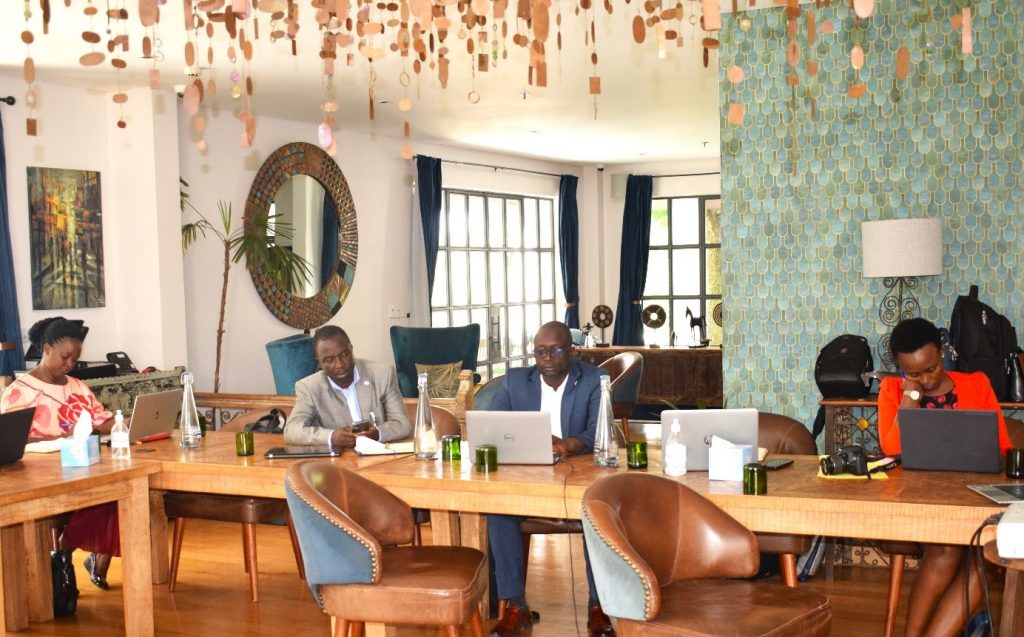Uganda is home to the largest refugee influx in the continent. This broad incursion of refugees who are mainly from various countries across the horn of Africa, East and Central Africa region often translate into challenges such as languages barriers and lack of documentation, among others. One of the main obstacles refugees and migrants face while seeking education and work opportunities in host countries is the lack of recognition of their prior studies and qualifications which has often limited their potential to contribute positively.
Lack of a shared qualification and credential framework among countries in the region has often presented the biggest challenges that hinder refugee transition, mainly learners to higher, tertiary and various levels of education denying them opportunities to pursue other existing educational opportunities and jobs within and outside the country.

Participants of the Scoping Mission on UNESCO Qualification Passport. ©UNESCO
In order to bridge this gap, a sustainable pathway dubbed UNESCO Qualification Passport (UQP) has been introduced by UNESCO as an international global standardized tool that substantiates and facilitates the recognition of refugees and vulnerable migrants with insufficient documentation of their prior qualification. This passport serves as a modern universal tool to facilitate mobility for refugees and vulnerable migrants without qualifications.
In pursuance of the above, Uganda held its maiden stakeholders dialogue on the qualification passport. UNESCO Project Office in Uganda working with the Uganda National Commission for UNESCO in partnership with the Ministry of Education and Sports organized a scoping mission on UNESCO Qualification Passport with activities involving visits to Nakivale Refugee Settlement to ascertain the status of the refugees and subsequently, a workshop to validate the field findings. As highlighted by Mr. Charles Draecabo, the refugee teachers remonstrated the lack of recognition of the prior qualification by Ugandan authorities as one of hardest challenges they have had to grapple with. Many allegedly qualified refugee teachers have settled for Teaching Assistant roles in refugee schools, as a mode of survival.
Following the field mission, two days validation workshop was organized at Latitude Zero Hotel in Kampala. This workshop brought together key stakeholders from within the Ministry of Education and Sports, Uganda National Examination Board (UNEB), National Council for Higher Education, Inter-University Council of East Africa, Ministry of Education and Sports, UNHCR among others, in an event held from 20-24 March 2023 in Kampala.
The meeting provided a platform for comprehensive discussion on the potential implementation of the UNESCO Qualifications Passport project in Uganda, using the recognition as the entry point and providing systemic strengthening in relevant areas in inclusion and higher education.

A group discussion session at the sidelines of the stakeholder’s workshop. ©UNESCO
Stakeholders were exposed to various modules including one on the implementation status and experience on the UNESCO Qualifications Passport in pilot countries Iraq and Zambia. Mr. Lewis Mbinza a Zambian Qualification Passport Officer delivered a comprehensive highlight of the pilot project initiation in Meheba Refugee Settlement in Zambia in 2019 noting that since its initiation in the country,
‘Over 92 candidates have been shortlisted with 44 persons substantiated and issued with the UNESCO Qualification Passported, and have since gone on to explore and pursue various existing opportunities.” Mr. Lewis Mbinza stated.
Mr. Mbinza further shed light on the importance and relevance of fast-tracking refugees into the national economies, stating that, “We do not see refugee as a burden to the country but rather, as individuals capable of contributing to social economic development through direct paying of taxes just like any other Zambian.” Mr. Lewis Mbinza.
Ms. Marina Malgina, President of The Association for International Credential Evaluation Professionals (TACIEP) provided a comprehensively overview of the methodology on Trainer for the credential evaluators on the Qualifications Passport recognition, highlighting that,
“The recognition passport provides correct information as a starting point for all the future activities and engagements such as education and potential employment of the refugee.” – Ms. Marina Malgina.

A section of facilitators of the stakeholder’s workshop. ©UNESCO
Ms. Yayoi Segi-Vltchek the Chief of Section at Migration at UNESCO Paris reiterated UNESCO’s commitment towards the realization and global acceptance of the qualification passport stating that, “our commitment as UNESCO is to support Uganda to have a strong education system which is safe, inclusive and in the heart of the 2030 agenda.”
The proceedings of the two-day event recommended the establishment of a core team of steering committee and involvement of major universities in region in order to add credibility to the credential verification process.

